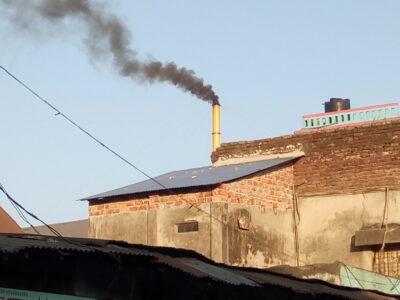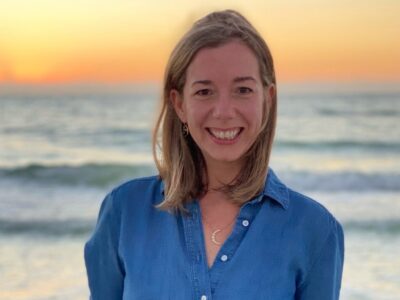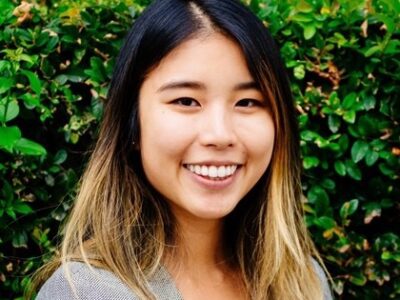Columbia University alumna Kimberly Oremus is currently an assistant professor in the School of Marine Science and Policy at the University of Delaware. She studies environmental and natural resource economics and policy, climate change, international agreements, and fisheries.

After receiving her B.S. in Management Science and Engineering from Stanford, she pursued a career in finance and consulting. While working in this industry, Ormeus quickly realized her passion for working on problems that benefited society, wanting to make a difference and rethink traditional approaches to environmental problems. Leaving the finance and consulting world, she switched to the environmental sector and began her first job working on fisheries. She soon found that creating solutions required understanding both natural science and environmental problems, but also involved understanding how people make decisions themselves.
These challenges led her to Columbia University, where she received an MPA in Environmental Science and Policy in 2011, before earning her Ph.D. in Sustainable Development in 2017. Now, she works on oceans and fishery policy, as well as the ways humans can adapt and develop policy to target climate change.
What drew you to the Sustainable Development program? What initially made you interested in studying environmental policy?
I went to Columbia to do the MPA program, which was a great introduction to the sciences and the interdisciplinary problem. But I kept feeling this need to go deeper and understand how we could think about this problem [of bridging the natural and behavioral sciences] systematically using data. That’s what attracted me to sustainable development. I sat in on a Sustainable Development Colloquium and it was the most impressive group of people I had met before. The questions they asked and their approaches just seemed like the future of where this field is headed.
It was the first place I saw people using data to actually answer interdisciplinary questions, as opposed to just being on one side of the question or the other. A lot of the work I saw before was mostly in the natural science side. It didn’t include a lot of understanding of human behavior — you know, the economic drivers — just a lot of things that move policy and why people do things. Some of the classes I felt were interesting during my Environmental Science and Policy program, especially the economic classes, started to focus more on some of that. But the Sustainable Development program definitely felt like they were bridging these two areas, which I hadn’t seen before.
How has your time in the SusDev program helped you conceptualize the work you’re doing now? Do you think it contributes to your research and how you solve problems?
I think that’s something unique about having a PhD, which I feel lucky about, is that I don’t think I’ve lost touch with those sectors [where I used to work]. But the difference is now they call me to be the expert and consult on projects, and we still partner on some things. That’s what’s really nice about academia — there is teaching, but a lot of it is the research component and it feels like you really can do whatever you want to do. I can be integrated with non-governmental organizations or with the National Oceanic and Atmospheric Administration in helping to define their priorities or even give them advice. I get questions all the time where there’s this argument, like, ‘This person is making on fishery policy, is it right?’ And then I can say, ‘Well, actually, there hasn’t been a paper on it yet,’ and they say, ‘Is that something you’re interested in working on with us? We aren’t sure how to go about doing it.’
So I do feel lucky to be in the position of starting to become that expert that can work across these entities. It’s a long career, and being in academia is just one part of it. But I can definitely see down the road working, engaging more in those sectors. I kind of see the next 40 years ahead of me, and all the different chunks of things I want to accomplish. There’s the research side. There’s driving the policy, actually implementing that research. And that’s one nice thing I think the SusDev program opened me up to: thinking about my career in that long trajectory and gaining the skill set to actually go on that trajectory.
What do you see as the most important part of teaching and being involved in the education of the next generation of scientists? Are there any particularly pressing issues or changes that you’ve seen just in the time that you’ve been teaching?
Definitely. I mean, the reason I was hired here at Delaware was because they really wanted someone to teach a coupled human-natural systems course. And they didn’t have anyone here with the backgrounds in both worlds to do that in marine science policy. I’m teaching a lot of students with backgrounds in strict disciplines: physical oceanography, ecology or social sciences and policy. For them, it’s one thing to read the papers from another field. It’s another thing to actually dig into the data and try to understand how you can answer a question in between the two spaces and how much the data we collect doesn’t even allow us to easily answer questions. Different entities collect them and use them in different ways. I think my class is focused on building an understanding of what the hurdle for interdisciplinary research really is. My students are getting a first-hand experience of how to tackle those problems.
Would you say that an interdisciplinary approach to research is becoming more common now? Would you say it is the way that the discipline is moving as a whole?
Yes, I’m finding more that it’s what everyone wants to do and everyone wants to fund, but no one really knows how to do it––that’s more the problem. And that’s partially because the systems that have been created are so siloed. It’s going to take a lot of work to build in the infrastructure, to collect data to actually address these questions. So I do think it’s the future, but I think it’s more complicated than just trying to get people to read papers and I think there’s a lot of having to get into the weeds of data to really address this issue.
Given your work on international oceans agreements, what steps do you think the new Biden administration should or could take to better protect oceans? Have you seen any promises from them that you like so far?
I think it’s very promising. I think, first of all, the fact that they’re taking this climate-first approach to how the NOAA is going to be run is already fairly promising, and this idea that they’re taking the decision of who is going to lead that entity very seriously is a really big shift from the past where they didn’t really have leadership, or they had interim leadership for a while. I recently read that some of the former heads of NOAA were calling for some changes. One of the biggest ones was data infrastructure and trying to invest in that. And I know a lot of people who are working there who really struggle with the current infrastructure. It just slows everything down when it’s not efficient. So I think that’s sort of what I would hope to see — strong leadership, a new reinvestment in the data infrastructure, and that they have more communication across different regions. But I do think it’s promising.
I do think, unfortunately, for the past couple of years it felt like the entity lacked any funding, any support. It really suffered. I’m hoping that will change. I also think there were a lot of great conversations during the debates about ocean policy for the first time. When the Green New Deal was out in the debates, I think the conversation shifted to thinking ‘What about the oceans? Should there be the Blue New Deal?’ And that really, I felt, opened up this dialog about the latest research and policy on oceans. I think that’s an important dialog to have because oceans are going to be developed so much over the next couple of decades. And I think there needs to be more planning and intention and understanding the consequences of that as well.
There seems to be a lot more awareness and discussion of climate change and environmental protection both from students and in the public eye. Do you think that an interdisciplinary approach to data can help administrations and governments think about policy and the problems we are seeing?
Yes, and I think everyone is on the same page that we need to have an understanding of the linkages between the two systems, environmental and economic. Every law proposed basically has a debate going on about how we can conserve the environment but preserve economic livelihoods. And, according to theory, these things are not actually in conflict with one another, except in certain circumstances and certain places.
But I think that’s where the rubber meets the road — actually getting the data and proving if these things are in conflict. Are they not? Are there areas where policy is actually beneficial for both the community as well as the environment? How do we intentionally plan a transition to things that can be beneficial for both? I think that’s what’s challenging moving ahead. It takes a lot of work to get the foundations to be able to analyze the large amount of data that the world is creating and to do that carefully. There are so many quick ways to analyze data where you fall into a lot of holes, where you don’t understand your assumptions and you don’t understand exactly what your outcomes mean. And so there’s no really quick path to this.
Do you have any advice for current students either looking into the program or who want to pursue a similar field of study?
I think the biggest advice I have is to figure out which type of person you are, because there are so many roles to play in this new field. Some people are going to be the ‘do-ers’ who are going to actually get the policy done and implemented. It’s a whole different skill set to take theoretical literature and apply it, versus the people who are going to go out and do the research and make that literature. Definitely read some of the papers that alumni have written and if you can, drop by into colloquium and the student presentations!
Madeleine Lemos is studying history and creative writing at Columbia University. She wrote this post when she was an intern in the Earth Institute office of communications.



